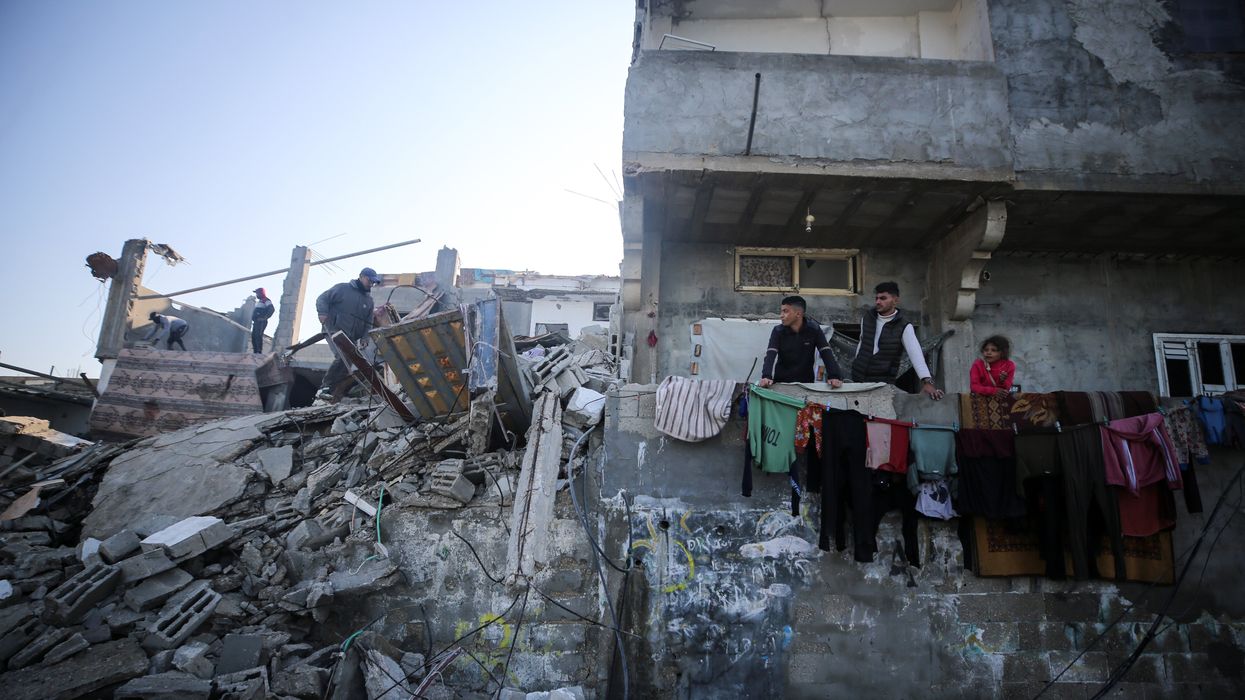Butler is a husband, father, grandfather, business executive, entrepreneur, and political observer.
The bloody and tragic conflict in Gaza could continue for months and even years. It is an extension of conflict that started before most of us were born and seems intractable. But Israel cannot eliminate Hamas, in the same way that the United States has been unable to eliminate Al Qaeda, ISIS or the Taliban.
These terror groups are not just people, but extreme ideologies. Attempts to eliminate the people of Hamas, especially with the inevitable and tragic “collateral damage,” will ultimately result in more ideologues. Only those who both support Hamas (whether actively or through their inaction) and live with the direct results of that support can end the ideology.
How did it get to this point? The land now referred to as Israel and Palestine has been the home of both Jewish and Arab peoples, and their ancestors, from before the beginning of recorded human history. The area has been conquered and controlled by a range of national entities over the centuries, with the local Jewish peoples usually being oppressed and sometimes forced from the area, later to return and re-establish themselves in what they saw as their homeland.
In modern times, since the end of World War I, there has been an international consensus for a two-state solution and, in November 1947, the United Nations General Assembly passed a resolution for a “Plan of Partition with Economic Union” that provided for “Independent Arab and Jewish States and the Special International Regime for the City of Jerusalem.” This two-state solution was rejected by neighboring Arab countries, which invaded Israel the day after it was formally established in 1948.
This begs a thought experiment:
Where would Palestinians and Israel be today if on May 15, 1948, the day after the creation of the state of Israel, the Palestinians had declared their own state and initiated diplomatic relations with Israel and the broader global community? What if members of the Arab League had welcomed this new state of Palestine and initiated diplomatic relations with Israel? I’ll leave you to think through what might have been, but we should also consider what could be.
Arab nations and the Palestinian Arabs themselves (or at least their leadership) continued their resistance to a two-state solution for decades before beginning to temper their views. This began when Egyptian President Anwar el-Sadat and Israeli Prime Minister Menachem Begin signed the Camp David Accords in 1978, with a final peace agreement signed in 1979. So momentous was this step that Sadat and Begin shared the Nobel Peace Prize in 1978. Sadat paid for this bold move with his life when he was assassinated by members of the Egyptian Islamic Jihad in 1981.
Following the first Intifada (from 1987 to 1993) the Oslo Accords were signed by the Palestine Liberation Organization and Israel, wherein each party recognized the other party’s legitimacy and established a framework for future negotiations. There was resistance to these Accords on both sides, and when the second intifada broke out in 2000, the Oslo process came to a halt. While the PLO ostensibly continues to support a two-state solution, Palestinian and Islamicist resistance continues. And yes, there are Israelis who also resist a two-state solution.
More recently, with the Abraham Accords, the historically anti-Israel countries of the United Arab Emirates, Bahrain, Morocco and Sudan each recognized Israel, and diplomatic relations were established. Whether directly or indirectly, the agreements all supported the two-state solution and a negotiated settlement of the Israeli-Palestinian conflict.
Most recently there appears to have been progress in peace negotiations between Israel and Saudi Arabia that included support for a two-state solution and a negotiated settlement between Israel and the Palestinians. There is speculation that Hamas, with the backing and encouragement of Iran, timed its Oct. 7 attack on Israel in part to pre-empt any such agreement.
So, while the Arab nations originally opposed a two-state solution, the trend is in this direction, though painfully slow and with tragic and violent interruptions. Several Palestinian and radical Muslim groups, including Hamas, continue to subscribe to the idea of a single Palestinian state “from the river to the sea,” and the eradication of Israel and the Jewish people. In 2006, the year after Israel unilaterally ended its occupation and settlement in Gaza, Hamas won the first (and so far, only) Palestinian legislative elections. Because of Hamas’ history of violence and its continued intent to eradicate Israel, most of the international community refused to recognize it as the legitimate leadership of Palestinians. But given Hamas’ influence and strengths, it has controlled Gaza ever since.
The barbaric attack Hamas conducted on Oct. 7 has prompted Israel to conduct its retaliation as a full-scale war with the explicit intent to eradicate Hamas. This has resulted in a higher level of civilian deaths, injuries and displacement than past responses. The human tragedy is obvious. But given the goal to eliminate Hamas and given the Hamas strategy of embedding itself among civilians, this is not surprising. Even if one believes Israel is doing its best to avoid such results, which is contradicted by the video evidence, we grieve for those civilians, and we know more Palestinians are being radicalized.
Israel made it clear from the beginning that this would be a war and not a mere retaliation, and that it would continue the war until Hamas had been eliminated. I wish Israel had made it clear to the Palestinians that they could avoid the coming war. How? By rising up and overthrowing their real oppressors – Hamas. This may seem impossible, but so does Israel’s objective of eradicating Hamas. The only people that can do that are the Palestinians themselves. Doing so would almost certainly require a violent revolution and likely many Palestinians would perish in the effort. But after 75 years of dying in a failed and futile effort to destroy Israel, when does it become obvious that another approach is in order? For those Palestinians who recognize two states as the only solution, for their children and grandchildren, they must renounce the Hamas ideology and remove the Hamas organization from power.
So let’s extend our thought experiment. What would result if the Palestinians themselves put an end to Hamas and sought peace with Israel in the framework of a Palestinian state? Again, I’ll leave it to you to think through what can be. For those who support Palestinians from afar, especially politicians and protestors, and most especially those who find it difficult to blame Hamas, what would result?




















Eric Trump, the newly appointed ALT5 board director of World Liberty Financial, walks outside of the NASDAQ in Times Square as they mark the $1.5- billion partnership between World Liberty Financial and ALT5 Sigma with the ringing of the NASDAQ opening bell, on Aug. 13, 2025, in New York City.
Why does the Trump family always get a pass?
Deputy Attorney General Todd Blanche joined ABC’s “This Week” on Sunday to defend or explain a lot of controversies for the Trump administration: the Epstein files release, the events in Minneapolis, etc. He was also asked about possible conflicts of interest between President Trump’s family business and his job. Specifically, Blanche was asked about a very sketchy deal Trump’s son Eric signed with the UAE’s national security adviser, Sheikh Tahnoon.
Shortly before Trump was inaugurated in early 2025, Tahnoon invested $500 million in the Trump-owned World Liberty, a then newly launched cryptocurrency outfit. A few months later, UAE was granted permission to purchase sensitive American AI chips. According to the Wall Street Journal, which broke the story, “the deal marks something unprecedented in American politics: a foreign government official taking a major ownership stake in an incoming U.S. president’s company.”
“How do you respond to those who say this is a serious conflict of interest?” ABC host George Stephanopoulos asked.
“I love it when these papers talk about something being unprecedented or never happening before,” Blanche replied, “as if the Biden family and the Biden administration didn’t do exactly the same thing, and they were just in office.”
Blanche went on to boast about how the president is utterly transparent regarding his questionable business practices: “I don’t have a comment on it beyond Trump has been completely transparent when his family travels for business reasons. They don’t do so in secret. We don’t learn about it when we find a laptop a few years later. We learn about it when it’s happening.”
Sadly, Stephanopoulos didn’t offer the obvious response, which may have gone something like this: “OK, but the president and countless leading Republicans insisted that President Biden was the head of what they dubbed ‘the Biden Crime family’ and insisted his business dealings were corrupt, and indeed that his corruption merited impeachment. So how is being ‘transparent’ about similar corruption a defense?”
Now, I should be clear that I do think the Biden family’s business dealings were corrupt, whether or not laws were broken. Others disagree. I also think Trump’s business dealings appear to be worse in many ways than even what Biden was alleged to have done. But none of that is relevant. The standard set by Trump and Republicans is the relevant political standard, and by the deputy attorney general’s own account, the Trump administration is doing “exactly the same thing,” just more openly.
Since when is being more transparent about wrongdoing a defense? Try telling a cop or judge, “Yes, I robbed that bank. I’ve been completely transparent about that. So, what’s the big deal?”
This is just a small example of the broader dysfunction in the way we talk about politics.
Americans have a special hatred for hypocrisy. I think it goes back to the founding era. As Alexis de Tocqueville observed in “Democracy In America,” the old world had a different way of dealing with the moral shortcomings of leaders. Rank had its privileges. Nobles, never mind kings, were entitled to behave in ways that were forbidden to the little people.
In America, titles of nobility were banned in the Constitution and in our democratic culture. In a society built on notions of equality (the obvious exceptions of Black people, women, Native Americans notwithstanding) no one has access to special carve-outs or exemptions as to what is right and wrong. Claiming them, particularly in secret, feels like a betrayal against the whole idea of equality.
The problem in the modern era is that elites — of all ideological stripes — have violated that bargain. The result isn’t that we’ve abandoned any notion of right and wrong. Instead, by elevating hypocrisy to the greatest of sins, we end up weaponizing the principles, using them as a cudgel against the other side but not against our own.
Pick an issue: violent rhetoric by politicians, sexual misconduct, corruption and so on. With every revelation, almost immediately the debate becomes a riot of whataboutism. Team A says that Team B has no right to criticize because they did the same thing. Team B points out that Team A has switched positions. Everyone has a point. And everyone is missing the point.
Sure, hypocrisy is a moral failing, and partisan inconsistency is an intellectual one. But neither changes the objective facts. This is something you’re supposed to learn as a child: It doesn’t matter what everyone else is doing or saying, wrong is wrong. It’s also something lawyers like Mr. Blanche are supposed to know. Telling a judge that the hypocrisy of the prosecutor — or your client’s transparency — means your client did nothing wrong would earn you nothing but a laugh.
Jonah Goldberg is editor-in-chief of The Dispatch and the host of The Remnant podcast. His Twitter handle is @JonahDispatch.